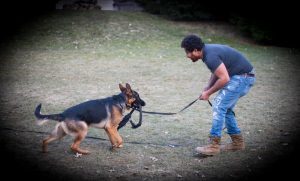Many dog trainers in Pittsburgh position themselves as the best dog trainers around. They may be top-tier, but with everyone claiming to be the best, how do you know what makes a dog trainer good? Here are some qualities we decided are important to look for when finding someone to train your furry friend.
A Good Dog Trainer Understands All Dogs Are Different
While different breeds of dogs show some consistency in areas of intelligence or other traits, they are all very different. Border collies are known for their intelligence and receptiveness to complex dog training, but there are always exceptions. A good trainer doesn’t judge a book by its cover and understands that no two dogs are exactly alike. Even if the canine in question is intelligent, there is no guarantee that it learns the same way as another dog of a similar pedigree. Dog trainers who are patient and have the ability to troubleshoot a dog’s behavior can produce a training atmosphere that enables stupid, spazzy, intelligent, calm, young, and old dogs to learn new tricks.
A Good Dog Trainer Has Patience
Everyone has days when stress gets to them more than usual, but patience cannot be understated when training a dog. Not every training session is going to go smoothly at first. Dogs, like people, have different personalities and aptitudes. When a dog trainer trains dog after dog after dog, they get accustomed to various responses. If the trainer works with three dogs in a row that respond quickly to training, and the fourth doesn’t seem to get it, they need the patience to adapt, see it through, and create a learning environment that works for that dog specifically, rather than get frustrated and not give that dog the attention it deserves. Even dogs that are quicker to respond to training require a patient dog trainer who is willing to repeat the same commands and reinforcements until the dog sees the pattern.
A Good Dog Trainer Is Consistent
Dogs learn through repetition. This means consistent responses to their behavior, predictable commands to bring out that behavior, and reinforcement that does not deviate. Not a machine-like consistency that is cold and unforgiving but a clear pattern that dogs can identify and act upon without becoming confused. The dog trainers’ expectations should be explicit and patient, and if something isn’t working at first, they need to know the right time to change their approach and not switch it up flippantly. They need to get to know your dog and learn to communicate with them in a way they can understand to make their training effective.
A Good Dog Trainer Communicates Effectively…
With The Dog
Dogs mostly communicate through body language. Though they can understand simple commands, unfortunately, dogs cannot use words to convey thoughts, needs, and intentions. A good dog trainer can interpret your dog’s body language and train them accordingly. The positioning of your dog’s head, ears, tail, and even hair (among other cues) can be helpful to a discerning dog trainer. When your dog trainer communicates with your dog, it involves more than just verbal cues to elicit the desired response. Rewards are a form of communication that every dog understands in varying degrees and are a great motivator to do what is requested. Hand signals are another way trainers can communicate with your dog.
With The Owner
While the ability of the trainer to communicate with your dog is of utmost importance, they must also communicate with you as the owner. Not only during the training process to show progress and further needs but after the training is complete, they need to teach you how to reinforce and maintain the behavior your dog has learned. If you return home, and you have not been taught how to keep your dog on its best behavior properly, and the importance of doing so has not been impressed upon you, then your dog is likely to regress, and you should seek another trainer. Spitze K9 provides ongoing communication in a private group, even after completing training, to help you and your dog.
A Good Dog Trainer Has A Relationship With Your Dog
In order to understand why your dog is behaving the way it is, and to increase the likelihood that it responds well to training, a good dog trainer forms a connection with your dog. When the trainer meets the trainee, they are strangers at first. Learning becomes easier when the walls come down, a bond is in place, and trust has been established. Teaching is more effective when it comes from someone you look up to and respect than it is from an unknown entity that’s hitting you in the face with a book and telling you there is a test tomorrow. Easing the dog’s anxieties or fears is only part of it. Your trainer needs to be able to empathize with your dog and show compassion but still know when to discipline them or discourage certain behaviors.
A Good Dog Trainer Has Training AND Experience
A good dog trainer has been trained themself! Everyone has to start somewhere whether it is simply the love of dogs or the accidental discovery of a natural gift. At some point to improve their effectiveness, understanding of fundamentals, or simply to fill in the gaps of their knowledge, a good trainer will have received an education from someone who knows more and has more experience. Regardless of their own discoveries, it is important to get different perspectives and methods from another source. You don’t know what you don’t know. On the other side of the collar, you shouldn’t take your dog to a trainer who doesn’t have experience because a training session doesnt always play out the way it does in a book. Much like a dog being trained, the trainer needs time and repetition to be effective.
A Good Dog Trainer Exhibits Professionalism
During the consultation, you should feel good about leaving your dog with the trainer or having them come back to your house for an in-home training session. They should present themselves with integrity and be courteous. A good dog trainer has high ethical standards for dealing with humans and dogs. Their training methods should be humane, and they should set and live up to realistic, tangible expectations.
A Good Dog Trainer Is Passionate About Training
Dog training requires dedication and passion. A trainer who trains dogs only for the paycheck and doesn’t have their heart in it may not be willing to put in the effort needed to turn challenging, undesired dog behaviors around and give you the tools to keep them going in the right direction. Everyone has bad days, but someone who thrives while teaching dogs can make a successful lifelong career and touch the lives of owners and dogs alike. Read the reviews they have received from other owners of dogs they have trained and see how they have performed in the past.
Dog Training With Spitze K9
At SpitzeK9 we bring passion, professionalism, experience, knowledge, consistency, and compassion to the table when we train your pet. Take a look at the training and accomplishments our organization has achieved over the years. If your dog is pulling on the leash, aggressive, not coming when called, jumping on people, or exhibiting any other undesirable behavior, bring them out to SpitzeK9! Call us today at 412-498-6635 or fill out a short form on our website!
Antonio has taken care of dogs since his youth and has worked with law enforcement agencies to train dogs in the US and Internationally as well as countless other pet dogs since he started Spitze K9.
He has been an established dog expert for years.




